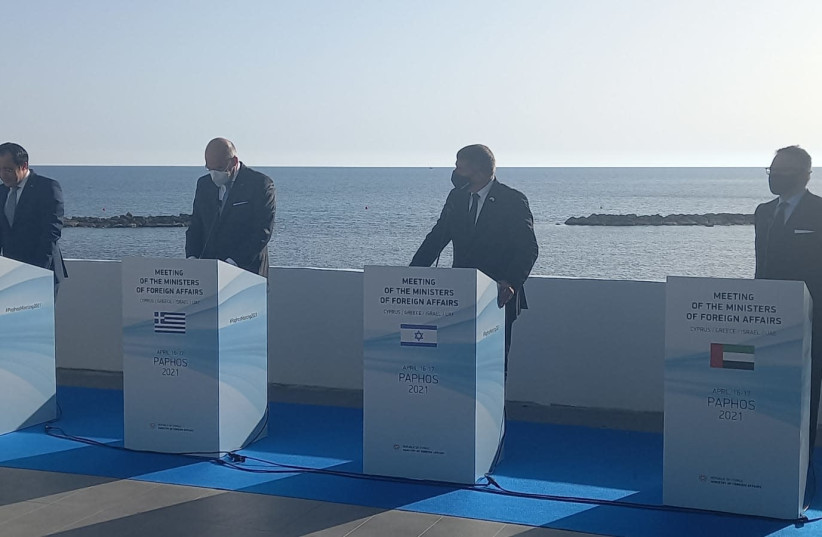Israel pledges to prevent a nuclear Iran in UAE, Cyprus, Greece talks
Foreign Minister Gabi Ashkenazi pledged to do “whatever it takes” to prevent Iranian extremists from acquiring nuclear weapons.
By TOVAH LAZAROFF
APRIL 17, 2021 11:40

From left to right: Cyprus Foreign Minister Nikos Christodoulides, Greek Foreign Minister Nikos Dendias,Israeli foreign minister Gabi Ashkenazi, and UAE Minister of Foreign Affairs Anwar Gargash at first joint meeting with the UAE since the Abraham Accords, Friday April 16th, 2021.
(photo credit: ISRAEL FOREIGN MINISTRY)
Advertisement
Israel pledged to do “what-ever it takes” to prevent Iran from producing nuclear weapons, when it participated Friday in the first ever quadratic meeting with the United Arab Emirates, Cyprus and Greece.
“We will do whatever it takes to prevent the extremist and antisemitic regime [in Tehran] from acquiring nuclear weapons,” Israeli Foreign Minister Gabi Ashkenazi told reporters in Paphos, Cyprus.
Cypriot Foreign Minister Nikos Christodoulides and his Greek counterpart Nikos Dendias also issued statements, as did UAE Minister of State for Foreign Affairs Anwar Gargash. Ashkenazi invited the three diplomats to visit Israel in the near future.
Israel, Cyrus and Greece already have a regional partnership, which they expanded on Friday for the first time to include the UAE, as a sign of the shifting alliances brought about by the Abraham Accords. Under the rubric of those accords, Israel normalized ties with the UAE, Bahrain, Morocco and Sudan.
“The meeting we held today is the first real step to expand the impact of the Abraham Accords with our partners Greece and Cyprus,” Ashkenazi said of the meeting. “This new and important four-way partnership stretches from the shores of the Arabian Gulf to the shores of Europe.”
During the conversations that took place in Cyprus on Friday, discussions were held on the dangers posed to the Middle East by Iran and its proxy Hezbollah, Ashkenazi said.
“Iran and its proxies bring destruction and instability to Syria, Lebanon, Iraq and Yemen,” he explained.
He spoke in the aftermath of sea skirmishes between Iran and Israel and on the same day Tehran moved closer to its ability to produce a nuclear weapon with an announcement that it began 60% uranium enrichment.
“Iran is striving to acquire nuclear weapons and continues to develop long-range missiles. Those would pose a significant threat to Israel and its neighbors,” Ashkenazi said.
“Israel is determined to defend itself against any attempt to harm its sovereignty and its citizens,” the foreign minister said.
He called on other regional countries to normalize ties with Israel under the Abraham Accords and also urged the Palestinians to engage in negotiations with the Jewish state. Such Israeli-Palestinian talks have been frozen since 2014.
But the issue of strategic threats was only one of the topics dealt with by the four men. They also focused on energy and economic cooperation as well as ways to combat the COVID-19 pandemic.
The basis of the meetings between Israel, Greece and Cyprus in the past has been a natural gas pipeline, which would extend to Europe and expand energy resources for those countries.
Ashkenazi said he hoped that the Eastern Mediterranean energy partnership would now extend to the Gulf.
Gargash said that the UAE sought an “ambitious and positive agenda in the region, and the Abraham Accords were driven by the necessity of an alternative strategic view of the region based on stability, prosperity and opportunity.”
The UAE, he said, believes that there should be constructive engagement and prosperity in the region through such partnerships.
“I have strong confidence that we will continue on the path to furthering our partnership through positive dialogue,” Gargash said.
The four diplomats also discussed issues involving Turkey, Libya and Syria.
